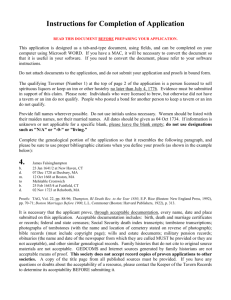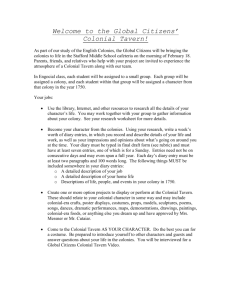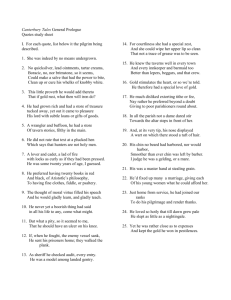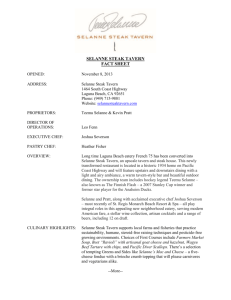DECISION OF DIRECTOR OF LIQUOR LICENSING
advertisement
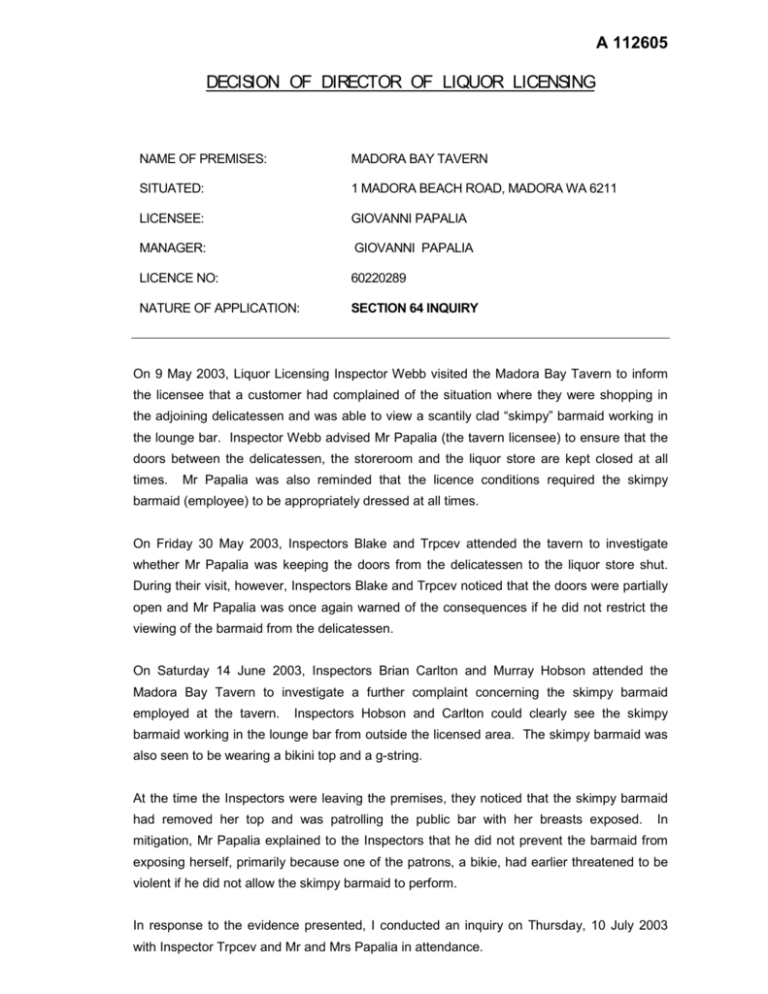
A 112605 DECISION OF DIRECTOR OF LIQUOR LICENSING NAME OF PREMISES: MADORA BAY TAVERN SITUATED: 1 MADORA BEACH ROAD, MADORA WA 6211 LICENSEE: GIOVANNI PAPALIA MANAGER: GIOVANNI PAPALIA LICENCE NO: 60220289 NATURE OF APPLICATION: SECTION 64 INQUIRY On 9 May 2003, Liquor Licensing Inspector Webb visited the Madora Bay Tavern to inform the licensee that a customer had complained of the situation where they were shopping in the adjoining delicatessen and was able to view a scantily clad “skimpy” barmaid working in the lounge bar. Inspector Webb advised Mr Papalia (the tavern licensee) to ensure that the doors between the delicatessen, the storeroom and the liquor store are kept closed at all times. Mr Papalia was also reminded that the licence conditions required the skimpy barmaid (employee) to be appropriately dressed at all times. On Friday 30 May 2003, Inspectors Blake and Trpcev attended the tavern to investigate whether Mr Papalia was keeping the doors from the delicatessen to the liquor store shut. During their visit, however, Inspectors Blake and Trpcev noticed that the doors were partially open and Mr Papalia was once again warned of the consequences if he did not restrict the viewing of the barmaid from the delicatessen. On Saturday 14 June 2003, Inspectors Brian Carlton and Murray Hobson attended the Madora Bay Tavern to investigate a further complaint concerning the skimpy barmaid employed at the tavern. Inspectors Hobson and Carlton could clearly see the skimpy barmaid working in the lounge bar from outside the licensed area. The skimpy barmaid was also seen to be wearing a bikini top and a g-string. At the time the Inspectors were leaving the premises, they noticed that the skimpy barmaid had removed her top and was patrolling the public bar with her breasts exposed. In mitigation, Mr Papalia explained to the Inspectors that he did not prevent the barmaid from exposing herself, primarily because one of the patrons, a bikie, had earlier threatened to be violent if he did not allow the skimpy barmaid to perform. In response to the evidence presented, I conducted an inquiry on Thursday, 10 July 2003 with Inspector Trpcev and Mr and Mrs Papalia in attendance. DECISION OF THE DIRECTOR OF LIQUOR LICENSING - MADORA BAY TAVERN 2 Mr Papalia was briefed on the nature of the proceedings and responded by advising that he and his wife have managed the Madora Bay Tavern for approximately 23 years. He explained the Madora Tavern is a small premises and that he only engages one skimpy barmaid between 6pm to 9pm on Friday nights, and 3.30pm to 7.30pm on Saturday afternoons. On most occasions, approximately 10 to 30 patrons would be present at any one time. He argued that his tavern provides a service to the public in terms of providing good meals and a place for people to socialise. It is a family run business and he has limited financial resources to employ security guards or extra bar staff. He emphasised that it was his first offence of this nature. Importantly, however, he did not refute any of the details outlined by Inspector Trpcev in his report. After considering the evidence of Inspector Trpcev, and the explanation offered by the licensee, I am satisfied that the breach is sufficiently serious to warrant a restrictive condition being imposed on the Madora Bay Tavern licence pursuant to section 64(3)(g) of the Liquor Licensing Ac 1988t. The restrictive condition will serve as a deterrent against further breaches of this nature and will be imposed in a manner which is consistent with previous decisions by this authority, for example, Bel-Air Tavern, The Burrendah Tavern and the Burlington Hotel. Therefore, during the period 1 August 2003 to 31 August 2003, the nature of entertainment will be restricted in accordance with the following condition: “The use or engagement of skimpy barmaids and strippers, or the provision of live entertainment by way of dance reviews, or similar performances, colloquially referred to as “Raunchy Shows”, is prohibited from 1 August 2003 until the 31 August 2003.” In addition, the following further condition is imposed: “Mr Papalia is required to demonstrate that he has successfully completed an accredited training course in liquor licensing before 1 October 2003.” I take the opportunity to also warn the licensee that any future transgressions regarding this type of entertainment could result in a similar restrictive condition being imposed for a longer period of time and/or a complaint being lodged under section 95 of the Act to the Judge of the Liquor Licensing Court for disciplinary action. H R Highman ___________________________________________ DIRECTOR OF LIQUOR LICENSING 24 July 2003
